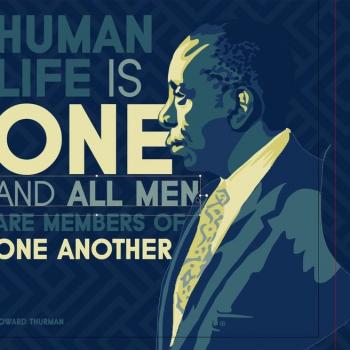The Adventurous Lectionary – Christ the King/Realm of Christ Sunday – November 24, 2024
Samuel 23:1-7
Psalm 132:1-12
Revelation 1:4b-8
John 18:33-37
Today’s scriptures invite us to consider God’s relationship to politics and culture as well as our own personal lives. If Christ is “king” or “ruler,” what does that mean in real life and everyday decisions regarding our domestic lives and political policy? Does the way of Christ have sovereignty in the affairs of nations? Should we model our personal and corporate lives after Christ’s way of life, including our voting? Should we ask our representatives to follow Jesus’ way in national and local policy? How do pastors preach about the reign of Christ when the election of Donald Trump appears to be the best proof that God is not in control? While we do not want a theocracy or established religion, we can advocate for policies that embrace diversity, welcome strangers, support the vulnerable, and affirm ecojustice and pathways to peace.
The authoritarian God of conservative Christianity lead to authoritarian religion and politics, the politics of exclusion and control. In the wake of the election, many of us are concerned that we go back to the days of patriarchal control, harassment of the persons of color, and the closeting of members of the LGBTQ+ community. There are some in power who call for our nation to return to what they believe to be Christian values. They are clear that expanded health care, contraception and abortion care, teaching science in schools, marriage equality, support of transgender people, hospitality to undocumented persons, and pluralism go against God’s plan for the United States and must be legally proscribed. In contrast, there are others – the readers of this commentary – who affirm pluralism and also want the best of faith values, not necessarily just Christian values, to motivate the quest for liberty and justice for all and care for the planet. Yet, are such values recommended in this text? Or, is there something more nuanced at stake, fidelity to God’s way while recognizing the limitations of our own viewpoint and the sovereignty of our native land? Still, even when we recognize the limitations of our viewpoints, we must press ahead to achieve God’s Shalom in history and move forward the moral arc of history.
I Samuel records David’s last will and testament. He audaciously asserts that God is speaking through him to the people and the words he is channeling involve God’s covenant with the house of David and his descendants. God has made an “everlasting covenant” with David’s descendants, which will never be broken. Twenty-first century Christians may wonder what such a covenant means: Does it involve solidarity with the state of Israel and a blank check for Israel to wage war in Gaza and Lebanon, and illegally appropriate West Bank land? Does it suggest, as the apostle Paul asserts, that God’s spiritual covenant with the Jewish people is eternal and that God’s salvation belongs to Jews as well as followers of Jesus in terms of the Jewish tradition but not necessarily the State of Israel? Is it much larger in scope, pertaining to God’s covenant with the faithful of all times and places?
Moreover, the notion of divine anointing can be dangerous. People have claimed divine anointing for Donald Trump and he has gone along with it. Conservative Christians have substituted the policies of Project 2025 for the Sermon the Mount. From this perspective: if God anoints you, then your enemies deserve any retribution they deserve, for simply challenging your authority. Anointing cannot be an invitation to persecution, ostracism, or dictatorship.
Psalm 132 continues the theme of God’s covenant with David, and counsels the people to be faithful to God’s promises to David. God has chosen the Jerusalem Temple as God’s holy place and it shall not be moved. Still, it is clear that neither I Samuel nor Psalm 132 give a blank check to David’s descendants, the state of Israel, or those who support Israel. Righteousness is demanded of those who follow in David’s footsteps. While we cannot formulate a foreign or defense policy on these passages, they suggest that Israel’s survival is important to God; they also suggest that Israel is called to be just to its neighbors, the Palestinians. God’s unique relationship with Israel is a call to justice and consideration of the needs of Palestinians, along with Israel’s national sovereignty. A preacher can recognize the covenant with Israel and hold that God has a covenant with all creation. Covenant is intended for service not domination.
Revelation describes Christ as universal, the alpha and omega, the origin and goal of all creation. The cosmic Christ encompasses all humanity and Christ’s sovereignty may lead to regret and grief but ultimately to the salvation of humankind. Christ’s power trumps political powers. Political potentates and bloviators will come and go, but God’s realm endures forever.
Interrogated by Pilate, Jesus proclaims that his realm is not of this world. These are challenging words, and beg further examination. Do they mean that Jesus’ realm is unrelated to the hardscrabble world of politics and culture? If so, the best course of action for Jesus’ followers is to retreat from all political and economic involvement. Throughout the ages, many have fled the cesspool of civilization to live monastically and maintain an island of purity in a world headed for shipwreck. Or, do Jesus’ words challenge us to a type of relativity in relationship to culture, economics, and culture, born of the recognition that no cultural system fully reflects or will ever fully reflect God’s realm of Shalom? To take history and politics seriously but not ultimate. Then again, our calling is to promote God’s realm on earth as it is in heaven, and this means political involvement. We can seek to transform the world toward God’s image of Shalom without claiming ultimacy for our position.
Today, it is clear that in our quickly moving interdependent world, we are connected with one another. There is no place to run or hide from political decisions or our complicity in injustice. It is also clear that the biblical tradition, especially the prophets and covenantal writings (including God’s covenant with David) are profoundly political and economic in orientation. What happens in the marketplace matters because our decisions shape the destinies of God’s beloved children. Politics matters because it limits or expands the spiritual opportunities of our most vulnerable companions. Economics matters because it influences the fate of the earth and the spread of the gospel.
Three weeks after the election, the question is not one of abandoning the world, but being involved in the world without succumbing to its values, especially those of incivility, divisiveness, violence, greed, and individualism. Paul asserts, “be not conformed to this world, but be transformed by the renewing of your mind.” “This world” has much virtue, but it is also polarizing on all sides, exclusivist, perpetuating of racism, sexism, and in and out group status. This “world” of polarization prefers opposition to contrast, and looks toward extremes rather than the common ground. In such a world, we must advocate for our vision of the future and our highest social and political ideals without demonizing our opponents. We must relativize our own position, recognizing its limits, while looking for value in those who oppose us. The prophetic imagination of alternative realities must inspire us to treat those who oppose us with the same care that we treat those for whom we advocate. Yet, we cannot be passive in relationship to the evils we deplore.
All systems, even the Davidic line are relative and subject to self-interest. Yet, the systems can be transformed to be better reflections of God’s love for the world and God’s desire that every child have sufficient housing, a healthy diet, quality education, and a safe place to grow.
+++
Bruce Epperly is Theologian in Residence at Westmoreland Congregational United Church of Christ. His professional career of nearly 45 years includes seminary and university teaching and administration, and university chaplaincy and congregational ministry. He is the author of over 80 books, including “Homegrown Mystics: Restoring the Soul of our Nation though the Healing Wisdom of America’s Visionaries,” “Saving Protestant Christianity to Save the World,” “Jesus: Mystic, Healer, and Prophet,” and his series of six 12 days of Christmas books, the most recent of which is “Once Upon a Time: The 12 Days of Christmas in Story and Film.”











